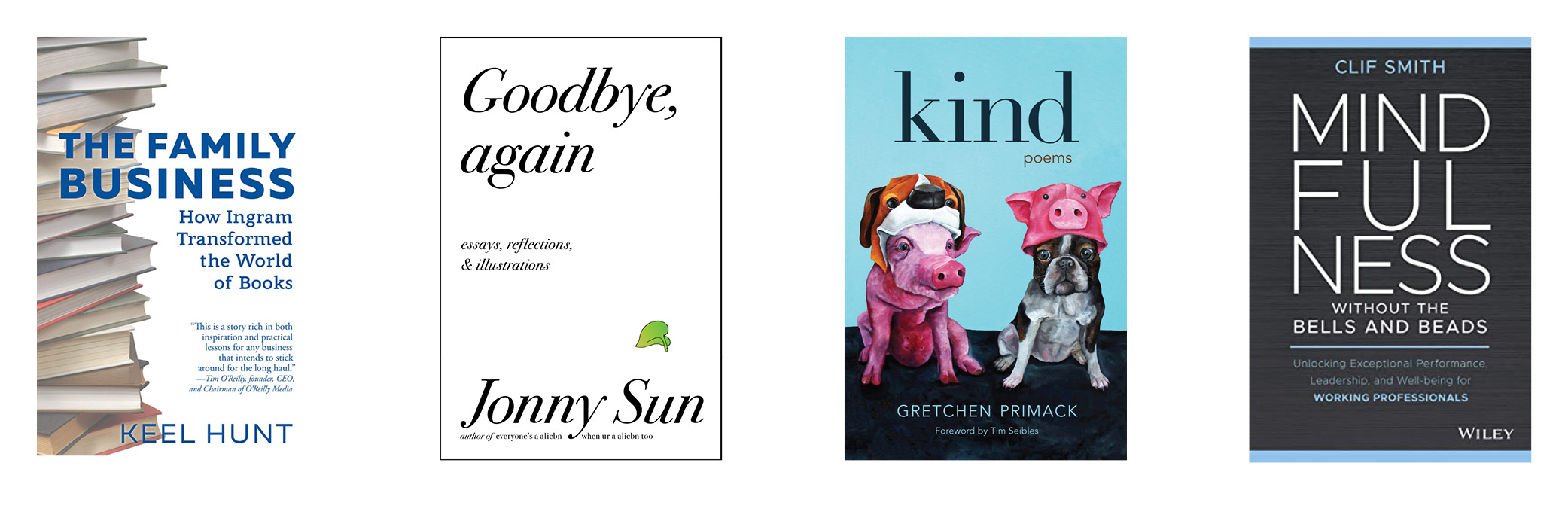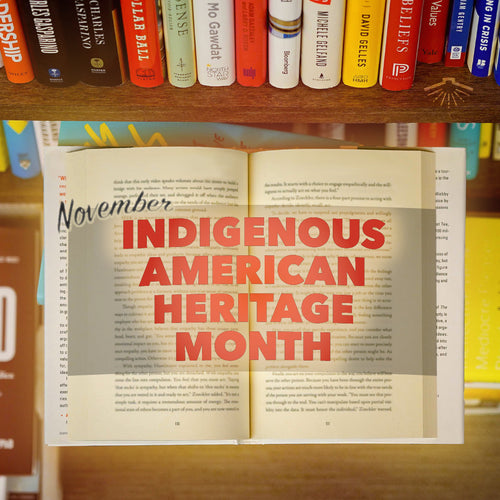Books to Watch | April 20, 2021
Each and every week, our marketing team—Editorial and Marketing Director Dylan Schleicher (DJJS) & Creative and Social Media Manager Gabbi Cisneros (GMC)—highlights a few new books we are most excited about.
This week, our choices are:

The Family Business: How Ingram Transformed the World of Books by Keel Hunt. West Margin Press
Though many see it as an anachronism, the book business has often led the way in American commerce. As Leah Price wrote in What We Talk About When We Talk About Books, “We’ve seen books pioneer self-service retailing in the eighteenth century, consumer credit in the nineteenth, automated inventory control in the twentieth, and e-commerce in the twenty-first.” From America’s founders to Amazon.com, making, marketing, and selling books in America has been at the forefront of change. A large reason that remains true today is because of one company most people have never heard of—Ingram Content Group.
But for all it has added to the way we do business, book publishing and selling has remained a notoriously complex and difficult business over the years, which is probably part of the reason it has the reputation of being stuck in the past. As Keel Hunt writes in his new book about Ingram, The Family Business:
[F]ew industries involve the development and introduction of so many new, unique products. No one really knows the number of new book titles published in the United States every year, but it is clearly well into the six figures. […] The challenge of pushing this many unique new products through the sales and marketing pipeline, and of advertising, publicizing, and promoting them so that potential readers are aware of them, is almost incalculable.
Add the fact that books often have similar sounding titles to other books, are released in multiple editions over the years, come from so many publishers and imprints all pushing new titles out every single week, and that older products continue to live and sell alongside new releases, and you can begin to see how complicated it could be to even get a handle on one’s inventory.
Enter Ingram. Beginning with its famous microfiche program for retail booksellers released in the mid ’70s (ask any old bookseller, and they’ll remember it fondly), Ingram helped solve that complexity, making it the backbone of modern bookselling. But even those of us who have worked in books for many years still don’t know a whole lot about the company, about its history and how it came to stand at the center of the bookselling universe. Keel Hunt’s new book tells that story. Beginning in heavy industries like timber, petroleum, and hauling cargo (sister company Ingram Marine Group still hauls heavy cargo on the nation’s inland waterways), the Ingram family got into books as a favor to an old family friend—acquiring the Tennessee School Book Depository to give a retired Vanderbilt business professor something to run after his retirement from the university. The rest, as they say, is history—meticulously documented by Ingram family friend and advisor Keel. It is a great story, a great education in the book business, and a book everyone in the business of books should own. (DJJS)
Goodbye, Again: Essays, Reflections, and Illustrations by Jonny Sun, Harper Perennial
We've been told again and again since March 2020 that we should give ourselves more breaks, to take every day slowly, to figure this new world out one step at a time. And Jonny Sun had been trying to slow down too—since roughly 2018. In the moments he took to relax, he started to document his meandering thoughts. So by focusing on not being so focused on productivity, he ended up writing a book. Jonny Sun is my hero.
Goodbye, Again is a reflective and subtly humorous book that fellow artists, writers, Type As, and anxiety-inclined minds everywhere will connect with.
These vignettes are between 1 and 10 pages long, some broken up by sketches. Sun seems like a very present person. Sharply attentive to how everything around him makes him feel—sometimes nostalgic, sometimes cared for, sometimes alone, and many times all those at once.
I realized that I'd been so used to being spoken over, to being cut off, to being conveniently not heard, to not being a major part of the conversation, that maybe a normal amount of talking in a safe and equal conversation made me seem like I was talking way too much.
Whether you identify with Sun's perspectives or not, Goodbye, Again will make a lasting impact on how you treat yourself and others in a culture centered on productivity. (GMC)
Stay tuned for a full review coming later this week!
Kind: Poems by Gretchen Primack, Lantern Publishing & Media
In the spirit of National Poetry Month and Earth Day this week, I'm highlighting Kind by Gretchen Primack. Containing ten new poems and a foreword by former poet laureate of Virginia Tim Seibles, this collection shifts back and forth between sentimental gazes and painful observations both outward and inward: at animals, landscapes, events, memories, and seasons.
In some poems, it's obvious that Primack is pushing us towards adopting a vegan diet—as when she centralizes small animals that we may not give thought to or when she humanizes other everyday animals like a cat in “Marie” or a cow in “Holstein”:
Had I been born
into a kind world,
my life would have been
mine, not a stranger's,
as long as my body wanted life.
The collection as a whole reads as a call for justice for humans as much as for animals and the planet. One poem's four human characters include an undocumented immigrant, an illiterate mother, a hungry thirteen-year-old, and a sadist who all work at a factory farm. In sparse yet grisly description, the pain of the animals upsets the humans (except for the sadist). We do what we must to get by in life, but the way this and other poems frame the work of slaughtering animals and the practice of eating them, the cruelty of it is obvious. Along with its environmental impact, this understanding of and empathy with animals reminds us how badly we must restructure our diets and, by extension, enhance our perception of morality. (GMC)
Mindfulness without the Bells and Beads: Unlocking Exceptional Performance, Leadership, and Well-being by Clif Smith, Wiley
There has been a huge push in business to embrace mindfulness exercises and practices. Clif Smith sees a parallel to the increased acceptance—even expectation—of leaders enlisting executive coaches. Having an executive coach was once seen as a mark of weakness, that something was wrong that needed fixing, but has come to be seen as a sign of strength, that you know you can continually improve and are always working to do so.
But, as Smith has found, the push toward mindfulness often comes in spiritual and new age trappings—even when such sessions are touted as a secular exercise—that can impede its acceptance in a business setting and make it harder to shed the stigma that it is only for those who can’t cope.
Mindfulness is on the cusp of finally making that leap out of the frame that you only do it if you are “broken” and can’t handle the rough-and-tumble modern world or when the wheels are coming off your life and you’re having an existential crisis. Having an “underlying condition” is not required to benefit from mindfulness. It can help you go from good to great when it comes to your performance, leadership, and well-being. Keeping mindfulness framed only in spirituality and wellness/stress relief limits its reach and impact.
Smith begins by sharing his own journey to mindfulness as a kind of proof of concept of its benefits. You’ll learn that Smith isn’t against bells and beads, per se—he has studied many spiritual writings and traditions and “meditated mere feet away from His Holiness, the Dalai Lama”—he simply knows that being devoted to the practice of mindfulness does not require them. Teaching that practice in a secular way, as he has to over 60,000 people in the Mindful Leadership program at Ernst & Young, is what the second part of the book is all about. Having built and run the program, he knows that it is not a one-approach-fits-all scenario, so he will introduce you to many ways to maintain a mindfulness practice. The important thing is to actively try them out, to incorporate a formal practice of some kind into your daily life. Smith offers guidance, but the real answer to almost any question or concern you may have once you’ve started to practice—whether you don’t know what to do next, aren’t sure if it is working, or feel too busy to fit it into your schedule—is to stay committed to the practice. (DJJS)



